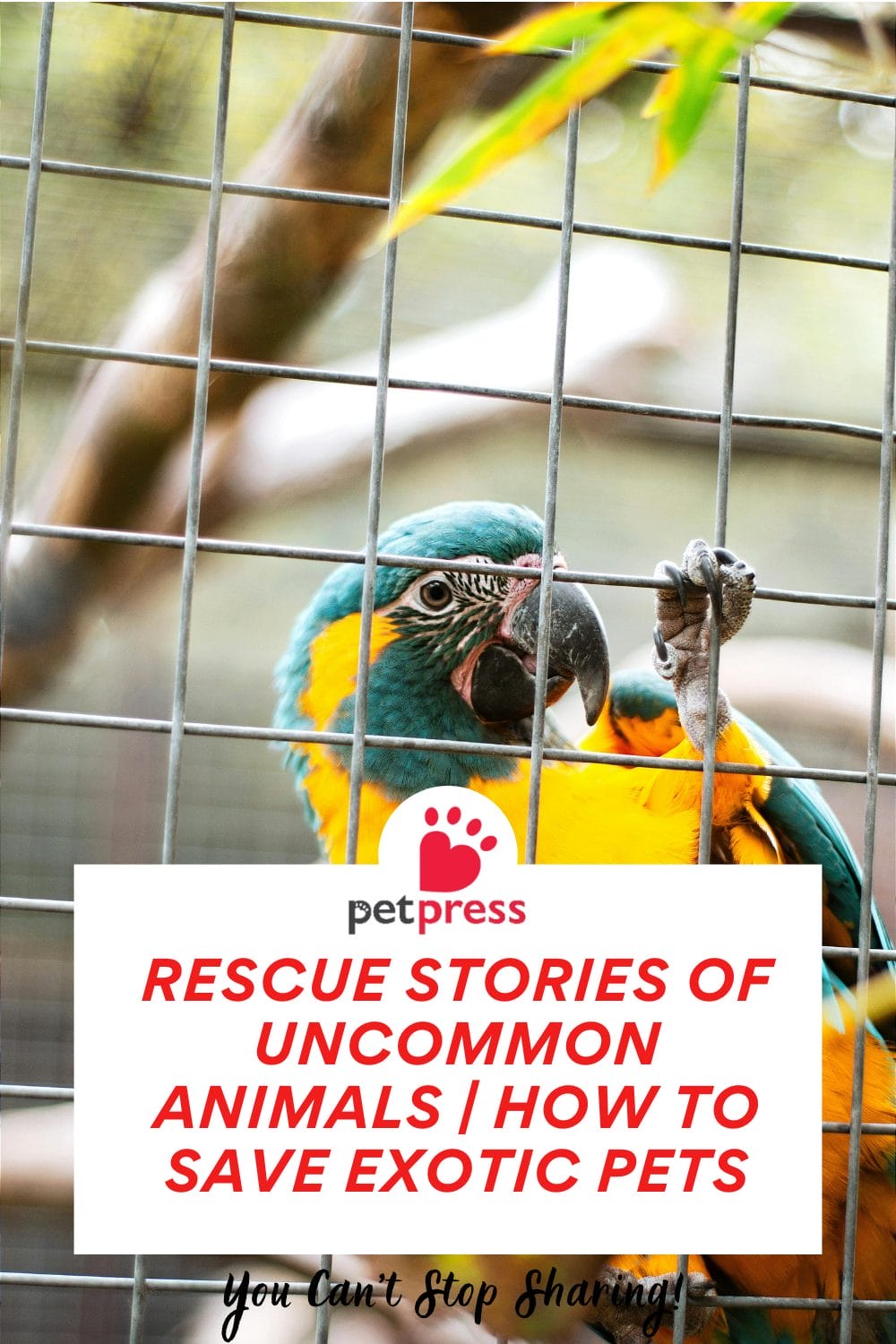
Most people envision rescue stories of uncommon animals being nursed back to health and placed in loving homes when they think of animal rescue.
When we think of animal rescue, most people envision nursing abandoned dogs and cats back to health and placing them in loving homes.
But what about uncommon animals? The world of animal rescue extends far beyond our traditional furry friends.
Each year, rescuers save thousands of exotic pets—from iguanas and parrots to ferrets and sugar gliders—many of whom they rescue from neglect, improper care, or abandonment.
This blog post dives into the lesser-known world of Rescue Stories of Uncommon Animals, shares real rescue stories, and provides essential care tips for those considering or already caring for these unique companions.
Why Rescue Uncommon Animals?

There’s a growing interest in unusual pets due to their distinct personalities, appearances, and behaviors. However, many people underestimate the responsibilities that come with these animals, leading to:
- Improper diets
- Inadequate housing
- Lack of mental stimulation
- Neglected veterinary care
Animal rescues and sanctuaries often step in when owners can no longer manage or care for their exotic pets.
By rescuing these animals, we give them a second chance at life—and in many cases, a better one.
Inspiring Rescue Stories of Uncommon Animals
Here are the inspiring rescue stories of uncommon animals you cannot afford to overlook.
Luna the Albino Python – From Fear to Fascination
Luna was found abandoned in a crate on the side of a highway in Arizona. Malnourished and cold, she was taken to a local reptile rescue center.
With months of medical care and proper nutrition, Luna now thrives in a secure, temperature-controlled habitat.
Rescue Insight: Many people buy snakes without understanding their needs.
Albino pythons, like Luna, require specific heat gradients, a carefully managed diet, and regular handling to avoid stress.

Kiwi the Parrot – Healing from Emotional Trauma
Kiwi, an African Grey Parrot, was rescued from a neglectful home where she was kept in isolation for years.
She plucked most of her feathers out due to stress. After intensive behavior therapy and socialization,
Kiwi learned to trust again—and even began mimicking phrases that reflected her improved mood.
Rescue Insight: Birds as pets are highly intelligent and social. Emotional neglect can lead to severe psychological effects.
Ollie the Hedgehog – The Forgotten Companion
Ollie was left behind during an apartment eviction. He was discovered dehydrated and underweight, but with care from a small exotic animal rescue, he recovered quickly.
He now lives with a foster family experienced in hedgehog care.
Challenges in Rescuing and Caring for Exotic Pets
Specialized Veterinary Care
Not all vets are trained in exotic pet care, which can make diagnosis and treatment difficult. Seek out avian vets, reptile specialists, or exotic animal clinics in your area if you’re caring for these animals.
Dietary Needs
Many uncommon animals have precise nutritional requirements. For instance:
- Ferrets are obligate carnivores.
- Iguanas need high-fiber, low-protein plant diets.
- Sugar gliders require calcium-balanced meals to avoid metabolic bone disease.
Proper Enclosures
Size, humidity, temperature, and enrichment are all crucial. A rescued tortoise won’t thrive in a small aquarium. A parrot needs toys and interaction—not just a cage.

Tips for Adopting and Caring for Uncommon Animals
Do Your Research
Before adopting a pet, research the specific species. Understand lifespan, habits, dietary needs, and behavior patterns. Some exotic pets like parrots can live for 60+ years.
Create a Safe Environment
Ensure you provide enough space, stimulation, and environmental controls. Some animals, like reptiles, need UVB lighting, while others need vertical climbing space.
Build a Support Network
Find a vet who treats your pet’s species. Join online communities or local groups focused on rare pet rescue or exotic pet parenting.
The Role of Rescue Organizations
There are hundreds of dedicated organizations working to rescue, rehabilitate, and rehome unusual pets. Some of the most notable include:
- The Exotic Animal Rescue and Pet Sanctuary (EARPS)
- Phoenix Herpetological Society
- Parrot Hope Rescue
These groups often rely on donations and volunteers. Consider supporting them through fostering, volunteering, or spreading awareness.
How You Can Help?
If you’re passionate about helping uncommon animals, here’s how you can make a difference:
- Adopt, Don’t Shop: Many rescued exotic pets are looking for second chances.
- Foster: Provide temporary homes for animals until they are permanently rehomed.
- Educate: Share knowledge about the responsibilities of owning exotic animals.
- Donate: Supplies, food, or funds can go a long way for nonprofit rescues.
Conclusion: Every Life Deserves a Second Chance

Whether it’s a forgotten hedgehog, a traumatized parrot, or an abandoned python, every rescued animal has a story worth telling.
Caring for uncommon animals can be deeply rewarding—but it also requires commitment, education, and compassion.
By supporting exotic animal rescues and promoting responsible ownership, we not only save lives—we also enrich our own.
Frequently Asked Questions Related To Rescue Stories of Uncommon Animals
A: It depends on your location. Some cities or states ban specific animals. Always check local laws before adopting an unusual pet.
Yes! Many organizations specialize in rehoming exotic pets. Adoption often includes education on proper care.
Often, yes. Specialized diets, equipment, and vet care can add up. It’s important to be financially prepared.
Consider leopard geckos, budgerigars (parakeets), ferrets, or guinea pigs—all relatively easier to manage for new owners.
Look for licensed facilities, transparent practices, and positive reviews. A good rescue will also provide education and post-adoption support.
- How to Celebrate a Dog’s First Birthday on a Budget: 2026 Guide - February 18, 2026
- Best Shampoo for Sensitive Skin Dog Grooming: 2026 Guide - February 12, 2026
- 40+ Aesthetic Names for White Dogs (2026 Unique & Rare List) - February 6, 2026


GIPHY App Key not set. Please check settings